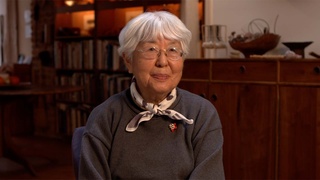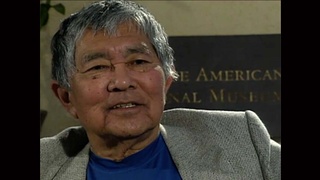Interviews
Didn't have rights that whites had
We didn’t have all the rights that caucasians had, and it was because of racism. And, of course, when December 7th happened, it was also hysteria, and Americans also looked at December 7th from a very economic point of view. I mean, Japan had been working the land. I mean, she was given only the worst kind of desert land and she made it fertile. And so, other farmers—caucasians—it would be to their advantage if the Japanese were thrown out, and they could work the land. Uh so, I think on what are the civil rights we lost: I think, well, we never had all the civil rights. Uh, and I think, that’s how come, too, that there came to be a group called the “No No Boys.” Because, they felt it was more important to fight for civil rights, than to fight the enemy. I think a lot of Japanese felt they weren’t treated like a real American.
Date: June 16, 2003
Location: California, US
Interviewer: Karen Ishizuka, Akira Boch
Contributed by: Watase Media Arts Center, Japanese American National Museum.
Explore More Videos


The lack of discussion about family’s incarceration in Amache
Sansei judge for the Superior Court of Los Angeles County in California


Being Confused about Racial Identity in Postwar United States
(b. 1932) Nisei American stage, film, and TV actress

Her brother’s reasons as a No-No Boy
(b. 1923) Japanese American poet, activist

Her grandfather was pressured to teach Japanese
Sansei judge on the Superior Court of Los Angeles County in California

Neighbor took care of her mother after grandfather was taken by FBI
Sansei judge on the Superior Court of Los Angeles County in California

Immediately after the bombing
(b. 1938) Japanese American. Hiroshima atomic bomb survivor

Other family members not as lucky
(b. 1938) Japanese American. Hiroshima atomic bomb survivor

His parents had little hope that he had survived the atomic bomb
(b. 1938) Japanese American. Hiroshima atomic bomb survivor

His views on nuclear weapons
(b. 1938) Japanese American. Hiroshima atomic bomb survivor

Loss When Leaving for Manzanar
Japanese American animator for Walt Disney and Hanna Barbera (1925-2007)

Forcibly deported to the U.S. from Peru
(b. 1936) Japanese Peruvian incarcerated in Crystal City

Stories of Grandfather at a concentration camp in Fusagasuga
(b.1974) Japanese Colombian who currently resides in the United States

Her grandfather in a concentration camp in Fusagasuga (Spanish)
(b.1974) Japanese Colombian who currently resides in the United States
